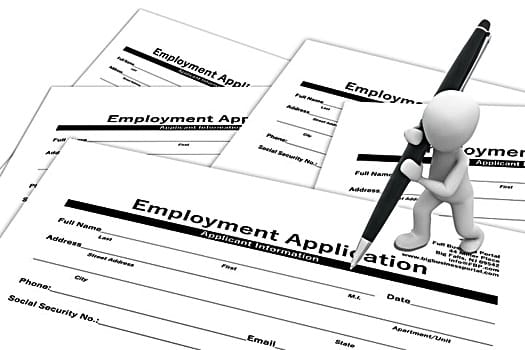“Every job I apply for turns me down!” Does that sound familiar? What about “I was rejected for a job I was perfect for!” Don’t worry—everybody’s been there at one point or another.
Searching for jobs can be demoralizing. Nobody likes being declined time and again. That applies to all aspects of life, but especially job applications. Living without a job is hard when you have bills to pay and are concerned about the future. One option is to apply for careers that nobody else wants — they get far fewer applications that regular office jobs.
But rejection is NOT a sign that you’re not good enough. It’s typically a simple problem with a solution. Below is the most likely reasons why your job application was rejected straight away. The one thing that you’ll notice is that they’re all things you can control. That means your future is in your own hands.
[su_list icon=”icon: check-circle”]
Why do I Keep Getting Rejected for Jobs?
A job application rejected immediately can make you feel worthless. But by identifying what the problem was, you can continually work on your applications. Before long, you’ll have learned precisely what it takes to get a job.
1) You Weren’t a Good Fit
The most obvious reason why your application was rejected is that you weren’t qualified for the role. Most jobs require something: a certain amount of experience or qualification. This is normally made obvious in the job description. The vast majority of the time, this isn’t a recommendation. It’s a requirement. So, go back and look at the jobs you applied for. Did you fit the specification they were looking for?
Look for the following requirements:
- Licenses required to do the job, e.g., in food preparation and hygiene
- Education needed to do the job, e.g., high school diploma or college degree
- Experience required to do the job, e.g., a particular number of years in the same field
- They wanted someone younger. There are jobs for women aged 50+.

According to The Hill, over a third of Americans have a degree. However, that doesn’t mean that you have the experience. And having the experience doesn’t mean you have the knowledge to back yourself up. You have to make sure you’re a good fit, whatever you apply for.
How to be a Good Fit for a Business
It’s possible for employers to make an exception if you don’t have quite enough experience. You may also get away with having grades just a bit lower than you should. But, if you continually apply for jobs you’re not a good fit for, you’re wasting your own time. Commit to widening your search to find more jobs you’re suitable for in the future.
2) Fix a Poor Quality Resume
The problem could also be that your resume isn’t quite polished enough. If you’re not tailoring your resume to fit each application, you’re dramatically lowering your chances of success. That’s because a customized resume says one thing to an employer. It says: I care about this position, and I want you to hire me.
By contrast, a cookie-cutter resume has a fast track straight to the trash. It gives the opposite impression: Sure, I’d like you to hire me, but I’m never going to go beyond the bare minimum effort if you do. Even if that’s not true of you, that’s what employers are thinking. Put yourself in their shoes: who would you hire?
A poor-quality resume might also be structured badly or full of small mistakes. Little problems like these can genuinely be the difference between being shortlisted and… not. Double check your resume to make sure there aren’t any obvious spelling mistakes.
How to Write a Better Resume
A little time and effort are all you need. Set aside an evening to work on your resume and make sure it’s not full of mistakes. Then, when you’re about to apply for a job, take another look. If the job description says that an employer wants a confident self-starter, pepper those words somewhere in your resume. That’s all it takes to tailor your resume and increase your chances of getting hired.
3) You Don’t Know How to Sell Yourself
Next up, the problem might be that you’re not that great at selling yourself. This is something that can be a little unfair. Say, for example, you have the right skills and qualifications. But you’ve never been the kind of person to blow your own trumpet and talk about your successes. Being humble has its time and place—that place isn’t on a resume.
Take a look at your resume. Put yourself in an employer’s shoes. Do you feel impressed? Or is it just a list of dates and business names?
The Solution:
When you write your resume and cover letter, you have to fill it full of hype. Don’t just list what you’ve done and where you’ve worked.
Put yourself forward and make yourself sound impressive:
- When I worked at ABC Inc., I achieved this
- During my time at XYZ Corp., I increased productivity in my department this much
- Over the course of my career, I’ve been named the employee of the month this many times
Even if you’ve not worked much before, this still applies. Talk about things you’ve achieved in sports or school. Or just make more of your essential skills so that you’re more marketable.
4) You Didn’t Want It Enough
This isn’t intended to be a comment on your commitment to getting back to work. Instead, it’s to point out a simple fact. When you’re out of work for an increasingly long time, you can get desperate. That leads to you feeling you’d take any job—anything. So what you spend your time doing is applying for anything and everything that comes your way.
There are benefits and drawbacks to this approach. Obviously, getting your resume out there as much as possible only increases your chances. In terms of putting your eggs in a number of baskets, that’s great. But in terms of proving to employers that you want their job, it’s not such a good idea.

When an employer looks at a resume and cover letter, they want to know that you want what they’re offering. They want somebody who’s committed for the long term and will give their all in the role. To find somebody who fits that mold, they look for the following signs that you want to work there.
- You flat-out state I would enjoy working for ABC Corp. because…
- You express interest in specific things about the job. For example, you talk about the specific on-the-job training they offer.
- You express interest in the career path you could follow from the position on offer. So, for example, you plan on taking the job and moving up the ladder to management.
How to Find Jobs You Really Want
First things first, you have to make sure that every job you apply for, you actually want. Sure, you would be happy with any job right now. But six months down the line, if you’re in a job you hate, you’ll be just as desperate to leave. When you apply for jobs, don’t let your desperation show. Only pick jobs you’d really like.
Then, when you do apply, make sure to make it clear how much you want that job. Use the three tips above to spruce up your cover letter. Which brings us to our next point—what if you don’t have one?
5) You Didn’t Send a Cover Letter
The problem might have been that you didn’t send a cover letter. If you’re not in the habit of sending one, now is the time to start. If you didn’t know, cover letters are a vital part of any application. They’re essentially a one-page piece—almost like a small essay—on why you want to apply for the job, and what in particular you think makes you stand out.
Cover letters give you the opportunity to really hone in on your strengths. In a resume, you’re restricted to one or two lines to describe what you achieved at a particular workplace. In a cover letter, you can go into a little more detail. They give you an opportunity to meld everything together and give a great impression.
How to Write a Cover Letter:
Set aside an evening that you can work on your cover letter. You start them off like a regular letter: To whom it may concern or Dear John Smith.
In your first paragraph, cover the following:
- Where you heard about the opening
- What drew you in and made you apply for the job
- What you like about ABC Corp.
Next, detail what you think makes you a good fit for the job. Use the job description here. If they want a good team player, talk about how good a team player you are. If they want somebody confident, talk about how you showed confidence in a previous role. End by asking them to genuinely consider your application, because you’d really love to work for them.
The great thing about writing your cover letter and resume is that you’re in control of the whole process, from start to finish. But what about if the reason you’re getting rejected isn’t your fault?
6) The Employer Uses an ATS (Applicant Tracking System)
An applicant tracking system is a piece of software that automatically screens applicants. As an employer, you can use them to filter out applicants that don’t make the grade for any reason you like.
For example:
- If your resume doesn’t mention that you have a degree or diploma, you’re automatically out
- If your resume doesn’t use a particular keyword—like ‘team’—you’re automatically out
- If you haven’t included enough experience on your resume, you’re automatically out

What’s the problem with ATS software? If you don’t tick every box, nobody at the business will ever see your resume. This eliminates any slack you might get from a real person. This can be especially frustrating if you have three years’ experience and a perfect skill set, but the employer asked for four years’ experience. A person might give you slack. ATS software won’t.
How to Avoid Applicant Tracking Systems
There’s nothing you can do to tell which businesses use ATS software. According to Capterra, an incredible 75% of employers do. However, there is a way around it: apply in person where possible. Make a point of going out in person to apply for jobs one day a week. Print off your cover letter and resume—enough times that you can hand them out to a few different employers.
This is the difficult part: walking into businesses and asking if they have positions available. It might feel awkward, but you’ll get used to it.
7) Unemployed for Too Long
It’s a vicious circle: the longer you’re out of work, the harder it gets to find a job. That’s because employers don’t know why you’ve been unemployed. It could be because of family issues. It could be because of an injury. But, like always, put yourself in the shoes of an employer. If they see you’ve been unemployed for three years, the first question they’ll ask is: why?
Unfortunately, this problem is difficult to get around. That’s why, according to Trading Economics, around 1% of US citizens are ‘long-term’ unemployed. You can’t address it easily without looking like you’re making excuses. But if you don’t address it, the employer fills in the blanks for themselves.
The Solution:
The best way to fill the gaps in your resume is by taking volunteer work, or by working as an intern. Positions like these don’t usually care about experience. They might not pay—or might not pay much—but they fill in employment gaps on your resume. They can also give you a valuable ‘in’ into specific industries. Creative industries like graphic design spring to mind, but the same rule applies across the board.
8) Too Overqualified for a Job
Another problem beyond your control is that you might be overqualified. Because of the nature of the job market and education, there are plenty of people with degrees, but not quite enough well-paid work to go around. That means that graduates are applying for entry-level jobs.
There are overqualified applicants all across the economy. This means that people with skills and qualifications are accepting more and more part-time, under-stimulating work. Unfortunately, when you’re overqualified for a position, three alarm bells start ringing for an employer.
- If you have a college degree, you probably feel you should be earning more than minimum wage. If you’re applying for an entry-level position, the hiring manager will think they’re going to want far more than I’m willing to offer. So, without even asking, they reject your resume out of hand.
- You’ve been rejected everywhere else. If you’re applying for jobs that aren’t in your field—or that are entry level—your potential employer will start to wonder why. Maybe it’s because you’ve been rejected wherever you applied. Not a good sign.
- You’ll be moving on. Last, they’ll think that even if they do hire you, you’ll move on soon. You’ll want more wages or a place higher up on the ladder. Or maybe you’ll want to move back into the field you studied in. Not good if they’re looking to hire long term.

Even if you’d be willing to accept minimum wage, these are the three impressions you’re making by applying for positions beneath your qualifications.
The Solution:
Keep working on finding a position you are qualified for. Depending on the industry, openings might be few and far between. Increase your chances by spending more time on each application you make instead.
9) There’s Too Much Competition for Jobs
This applies especially to jobs that get a lot of candidates interested. When a business is hiring for a popular job, they can afford to be choosy. They can afford to shortlist only the very, very best applications they received. If you’re not the best of the best, then you’ll miss out—even though you’re still qualified and a good fit.
This applies both to low and high-level jobs. When the economy in a certain area isn’t so great, there can be hundreds of applications, all for the same basic jobs. This means you’re unlikely to be picked simply because of the sheer number of people going for the same job.
Fortunately, this isn’t the case at the moment. According to the New York Times, unemployment figures are close to all-time lows. However, if there’s another recession, you’ll notice far more competition.
The Solution:
First, you should apply for some jobs that nobody wants. Because they’re hard or boring jobs, there’s far less competition for them. Plus, there are some that actually pay surprisingly well.
Second, you could consider broadening your search. If there aren’t any jobs in your hometown, consider looking for positions a few miles away. If you’re close to a city, there might be better chances for you there. This especially applies to small towns whose economies aren’t developed.
If you’re open to moving away, you could even consider moving somewhere across the country. This is a great idea if you have unique experience or expertise. In tech, for example, there are a few locations where there are far more jobs. San Francisco springs to mind. And some cities, like NYC or LA, have far more entry-level jobs and better career progression than somewhere out in the country.
10) They Hired Internally
Last but not least, the business may have been hiring internally. Because of rules and regulations, businesses often have to consider external applicants. However, most businesses prefer to hire known quantities, especially for management positions. They may, therefore, have advertised the job, but never intended to hire anybody externally.
Unfortunately, there’s no good way of avoiding adverts like these. All you can do is keep plugging away and applying for jobs.
Are There Any Other Reasons for Automatic Rejection?
All of that being said, the reason you were rejected might not be obvious. If you’ve carefully considered the reasons above, and none of them seem to fit, you’ve got one option left. All you have to do is give the employer an email or a call. Ask them:
“If you don’t mind, I’ve got a quick question. What was it that led to you picking another candidate? I’d like to know because it will help me in my future job search.”
Sometimes you’ll get a token answer: we just didn’t think you were a good fit, for example. But other times you’ll get a genuine response. It could be something in the list above. It could be a simple spelling mistake. But whatever the reason, you’ll be able to work on it, and improve for next time. If you continually work on improving your applications, there’s only one outcome. You’ll be hired in no time.
Feel free to read our guide to finding work using the internet to improve your employment prospects.
[/su_list]
